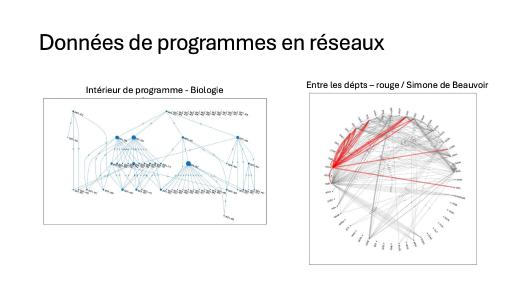
Dr. Richard Courtemanche, PhD
Pronouns: He/Him
Thesis supervisor Seeking students
- Professor, Department of Health, Kinesiology & Applied Physiology
Are you the profile owner?
Sign in to editResearch areas: Neurophysiology, oscillatory activity, network coherence, connectivity, cerebellum, basal ganglia, motor control
Contact information
Biography
Research interests
Neurophysiology, oscillations, movement, synchrony, population coding

Exemple de données réseau de curriculum
Richard Courtemanche
Research
Overview
How do neurons talk to one another? Using neurophysiological techniques, students and myself aim to identify how the activity in the brain is coordinated, either in the basic rhythmicity or in a functional manner. We use recordings from many electrodes to describe brain waves and nerve cell activity. In the cerebellum specifically, it is not yet known how groups of cells interact to produce coordinated sensation and behavior. Techniques used in the lab focus on describing the underlying mechanisms shaping populations of neurons, using signals from many single units as well as field potentials in vivo in the awake or anesthetized animal.
I study the neurophysiology of neuronal oscillations, centering on the cerebellum and basal ganglia.
Funding
NSERC Grant
FAS AD Research stipend
Current lab members
Mahgol Darvishmolla, PhD student in Health and Exercise Science
Sofia Constantopoulos, MSc student in Health and Exercise Science
François Pointeau, PhD student in Health and Exercise Science
Michael-Norman Lagendyk, BSc Honours student in Kinesiology and Clinical Exercise Physiology
Publications
|
Lévesque M, Gao H, Southward C, Langlois JMP, Léna C & Courtemanche R (2020) Cerebellar cortex 4-12 Hz oscillations and unit phase relation in the awake rat. Frontiers in Systems Neuroscience; 14: 475948 (doi: 10.3389/fnsys.2020.475948), (Special Issue: Information Processing in the Cerebellum; 2020 IF: 3.293). Tremblay SA, Chapman CA & Courtemanche R (2019) State-dependent entrainment of prefrontal cortex local field potential activity following patterned stimulation of the cerebellar vermis. Frontiers in Systems Neuroscience, 13, Art 60, pp. 1-16 (Special Issue: Information Processing in the Cerebellum; 2019 IF: 3.928).
Courtemanche R & Cammalleri A (2019) Basal Ganglia: Striosomes and the link between motivation and action. Current Biology, 29(2), pp. R62-R65. (doi: 10.1016/j.cub.2018.11.051) (2019 IF: 9.251)
|
|
Robinson JC, Chapman CA, & Courtemanche R(2017) Gap junction modulation of low-frequency oscillations in the cerebellar granule cell layer. The Cerebellum, 16(4) pp. 802-811 (doi:10.1007/s12311-017-0858-5) (2016 IF: 3.234).
|
|
Chadnova E, St-Onge N, Courtemanche R, & Kilgour RD (2017) Kinematics and muscle activation patterns during a maximal voluntary rate activity in healthy elderly and young adults. Aging Clinical and Experimental Research, 29(5), pp. 1001-1011 (electronic 2016 - doi: 10.1007/s40520-016-0688-1) (2017 IF: 1.394).
|
Frederick A, Bourget-Murray J, Chapman CA, Amir S, Courtemanche R (2014) Diurnal influences on electrophysiological oscillations and coupling in the dorsal striatum and cerebellar cortex of the anesthetized rat. Frontiers in Systems Neuroscience 8:145 [Abstract] [Content]
Frederick A, Bourget-Murray J, Courtemanche R (2014) Local Field Potential, Synchrony of. In Jaeger D, Jung R (Eds.) Encyclopedia of Computational Neuroscience, Springer NY. [Content]
Courtemanche R, Robinson JC, Aponte DI (2013) Linking oscillations in cerebellar circuits. Front Neural Circuits 7:125. [PubMed] [Content]
Courtemanche R, Chabaud P, Lamarre Y (2009) Synchronization in primate cerebellar granule cell layer local field potentials: basic anisotropy and dynamic changes during active expectancy. Front Cell Neurosci 3:6. [PubMed] [Content]
Levesque M, Langlois JM, Lema P, Courtemanche R, Bilodeau GA, Carmant L (2009) Synchronized gamma oscillations (30-50 Hz) in the amygdalo-hippocampal network in relation with seizure propagation and severity. Neurobiol Dis 35:209-218. [PubMed] [Content]
Tremblay PL, Bedard MA, Levesque M, Chebli M, Parent M, Courtemanche R, Blanchet PJ (2009) Motor sequence learning in primate: role of the D2 receptor in movement chunking during consolidation. Behav Brain Res 198:231-239. [PubMed] [Content]
Dugue GP, Brunel N, Hakim V, Schwartz E, Chat M, Levesque M, Courtemanche R, Lena C, Dieudonne S (2009) Electrical coupling mediates tunable low-frequency oscillations and resonance in the cerebellar Golgi cell network. Neuron 61:126-139. [PubMed] [Content]
Levesque M, Bedard MA, Courtemanche R, Tremblay PL, Scherzer P, Blanchet PJ (2007) Raclopride-induced motor consolidation impairment in primates: role of the dopamine type-2 receptor in movement chunking into integrated sequences. Exp Brain Res 182:499-508. [PubMed] [Content]
DeCoteau WE, Thorn C, Gibson DJ, Courtemanche R, Mitra P, Kubota Y, Graybiel AM (2007) Oscillations of local field potentials in the rat dorsal striatum during spontaneous and instructed behaviors. J Neurophysiol 97:3800-3805. [PubMed] [Content]
DeCoteau WE, Thorn C, Gibson DJ, Courtemanche R, Mitra P, Kubota Y, Graybiel AM (2007) Learning-related coordination of striatal and hippocampal theta rhythms during acquisition of a procedural maze task. Proc Natl Acad Sci U S A 104:5644-5649. [PubMed] [Content]
Courtemanche R, Lamarre Y (2005) Local field potential oscillations in primate cerebellar cortex: synchronization with cerebral cortex during active and passive expectancy. J Neurophysiol 93:2039-2052. [PubMed] [Content]
Hutchison WD, Dostrovsky JO, Walters JR, Courtemanche R, Boraud T, Goldberg J, Brown P (2004) Neuronal oscillations in the basal ganglia and movement disorders: evidence from whole animal and human recordings. J Neurosci 24:9240-9243. [PubMed] [Content]
Courtemanche R, Fujii N, Graybiel AM (2003) Synchronous, focally modulated beta-band oscillations characterize local field potential activity in the striatum of awake behaving monkeys. J Neurosci 23:11741-11752. [PubMed] [Content]
Courtemanche R, Pellerin JP, Lamarre Y (2002) Local field potential oscillations in primate cerebellar cortex: modulation during active and passive expectancy. J Neurophysiol 88:771-782. [PubMed] [Content]
Courtemanche R, Sun GD, Lamarre Y (1997) Movement-related modulation across the receptive field of neurons in the primary somatosensory cortex of the monkey. Brain Res 777:170-178. [PubMed] [Content]
Courtemanche R, Teasdale N, Boucher P, Fleury M, Lajoie Y, Bard C (1996) Gait problems in diabetic neuropathic patients. Arch Phys Med Rehabil 77:849-855. [PubMed] [Content]
Boucher P, Teasdale N, Courtemanche R, Bard C, Fleury M (1995) Postural stability in diabetic polyneuropathy. Diabetes Care 18:638-645. [PubMed] [Content]Biography
Fun fact
In my dreams, I play tennis really well.
Richard Courtemanche obtained his Ph.D. in Neurological Sciences (2000) from Université de Montréal, working with Dr. Yves Lamarre, and received his M.Sc. in Physical Activity Sciences (1994) from Université Laval under the supervision of Dr. Normand Teasdale. He did his postdoctoral training at the Department of Brain and Cognitive Sciences of the Massachusetts Institute of Technology, in the laboratory of Dr. Ann M. Graybiel. He joined the Department of Exercise Science at Concordia in 2002, and was received as a member of the Center for Studies in Behavioral Neurobiology in 2004.
Lab Alumni
Undergrads
Ariana Frederick, research assistant, Independent Study, FRSQ Summer Research Internship and Honours in Exercise Science, May 2011-Aug 2013. Honours: Circadian rhythmicity and network electrophysiology in the cerebellum and basal ganglia. M.Sc. in Biology, Concordia University (Dr. Amir), Laboratory Technician at Dept. of Clinical Neurosciences, Univ. of Calgary.
Jaymee Shell, volunteer research assistant, Honours in Exercise Science, Jan 2012-Jun 2014. Honours: Ice hockey stickhandling rhythmic performance and sensorimotor TENS stimulation effects". M.Sc. in Kinesiology & Physical Education, McGill University (Dr. Pearsall), and M.D. student at McMaster University.
Justin Dionne, volunteer research assistant, Jan 2012-Jul 2012. Project: Developing a human posture paradigm as influenced by TENS. M.Sc. student in Exercise Science, Concordia University, in my lab.
Shannon Bellevue, Science College student, Jan-Aug 2013. Project: Integrating video body orientation and force platform data in rats.
Yousuf Uddin, Independent study, Jan-Aug 2016. Project: Integrating EEG with posture measurement and electrical stimulation.
Ronald Arrieta, Independent Study, Sept 2016-May 2017. Project: Neurophysiological representations and mapping of oscillations in the cerebellum.
Grads
Jonathan Bourget-Murray, MSc student Exercise Science at Concordia University, Sept 2009 – 2012 (withdrew). Project: Parameters influencing oscillations in the cerebellum and striatum of the rat. 2010 W.R. Sellers Award Winner. M.D. resident, McGill University/Univ. of Calgary.
Daniel I. Aponte*, MSc Exercise Science, Concordia University, Sept 2010 – Nov 2013. Graduated, Jun 2014. Thesis: A novel task for evaluating anticipatory postural behaviour in rats. Ph.D. student, Kinesiology and Physical Education, McGill University (D. Pearsall).
Justin Dionne*, MSc Exercise Science, Concordia University, Sept 2012-Jan 2018. Graduated, Jun 2018. Thesis: Exploring the effects of rhythmic afferent alpha and gamma range electrical stimulation on processing mechanisms in a tone discrimination dual-task paradigm. 2013 W.R. Sellers Award Winner.
Stéfanie Tremblay*, MSc Exercise Science, Concordia University, Sept 2016-Dec 2018. Thesis: Cerebello-cortical coherence of local field potentials following patterned stimulation of the cerebellar vermis. 2018 W.R. Sellers Award Winner.
Amanda Cammalleri, MSc student Exercise Science at Concordia University, Sept-Dec 2018.


